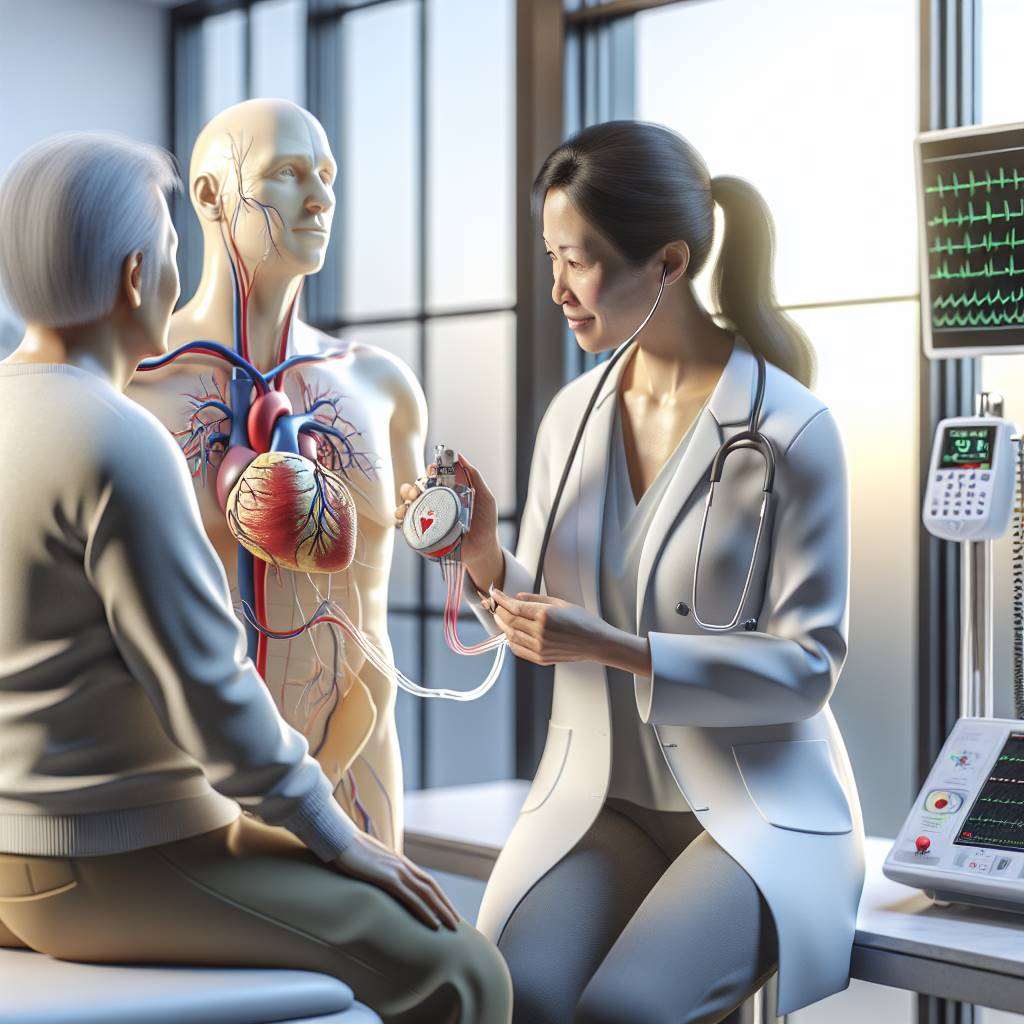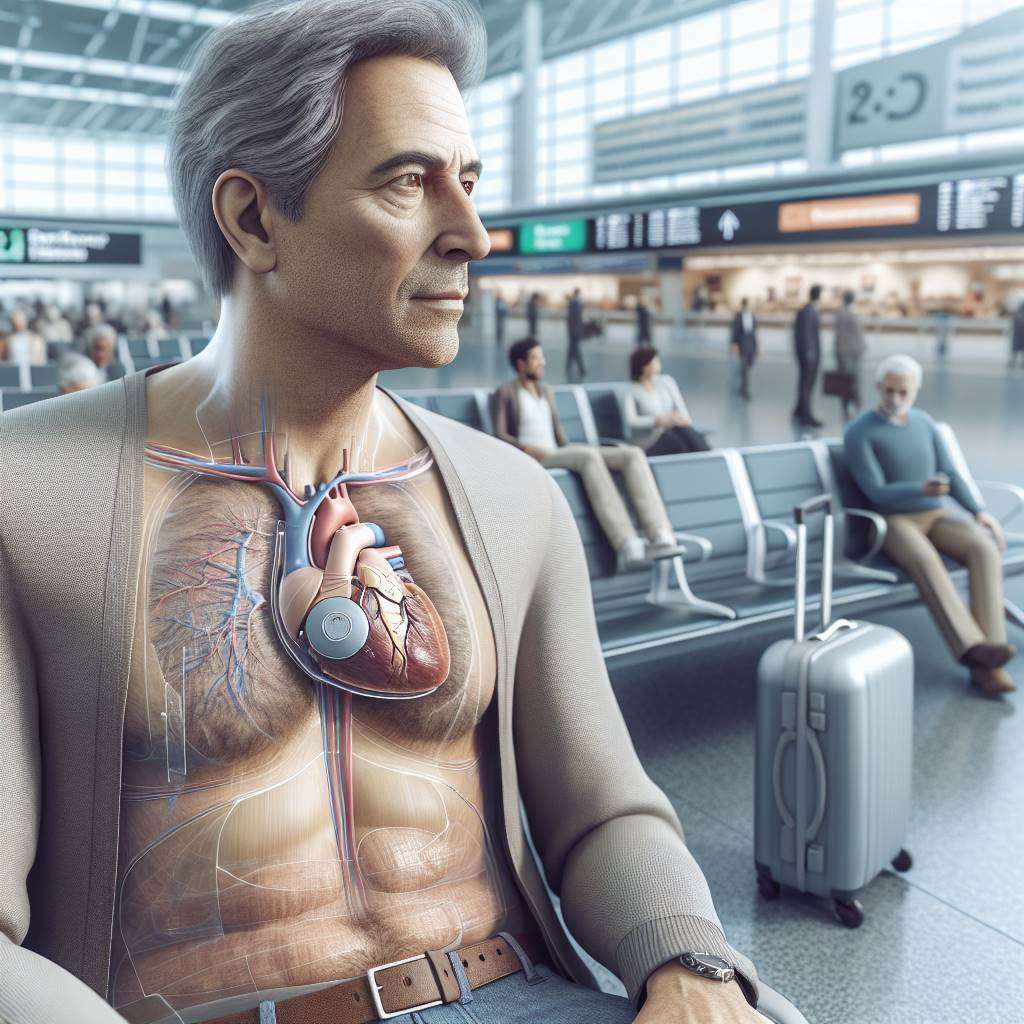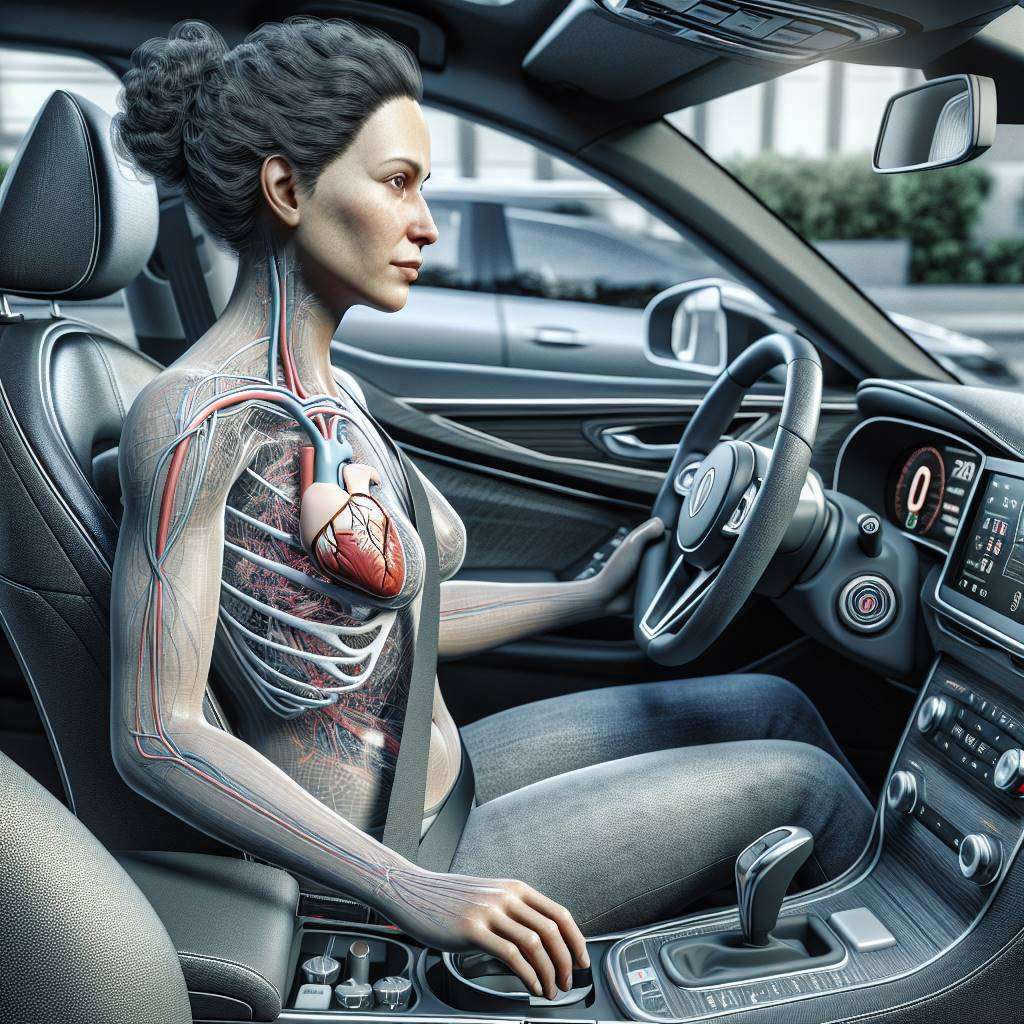Living with an Automatic Implantable Cardioverter Defibrillator (AICD) can bring significant changes to your daily routine. This device is crucial for managing life-threatening heart conditions like arrhythmias, but it also comes with certain restrictions. Understanding how to adapt to these changes is essential for maintaining a safe and fulfilling lifestyle.
Medical disclaimer: This content is for general awareness and does not replace a doctor’s consultation. For diagnosis or treatment decisions, consult a qualified specialist.
From driving limitations to considerations while traveling, patients with an AICD must navigate various challenges. By following medical advice and making informed adjustments, you can ensure your safety and well-being. This guide explores key aspects of life with an AICD, including driving, traveling, and daily restrictions, to help you live confidently and comfortably.
Can You Drive Safely with an AICD Implanted?
Driving with an AICD is a common concern for patients. While the device is designed to protect you from sudden cardiac events, certain conditions may temporarily or permanently restrict your ability to drive. For instance, if you've experienced a recent cardiac arrest or shock from the device, your doctor may recommend avoiding driving for a specific period.
In India, driving regulations for individuals with an AICD vary based on medical guidelines and the type of vehicle. Commercial driving is often restricted, while personal driving may be allowed after a stable period. Always consult your cardiologist to understand your specific restrictions and ensure compliance with local laws.
To drive safely, monitor your symptoms, avoid driving if you feel unwell, and schedule regular follow-ups to assess your condition. Remember, your safety and the safety of others on the road should always come first.

Traveling with an AICD: Tips for Stress-Free Trips
Traveling with an AICD is entirely possible, but it requires careful planning. Before your trip, consult your doctor to ensure your condition is stable and discuss any potential risks. Carry a detailed medical ID card that includes information about your AICD and emergency contacts.
When flying, inform the airline about your condition in advance. Most airlines accommodate passengers with medical devices, but you may need to provide documentation. Avoid prolonged sitting during long journeys to reduce the risk of blood clots. Take breaks to stretch and move around.
- Pack all necessary medications and keep them in your carry-on luggage.
- Bring a copy of your latest medical reports and AICD settings.
- Stay hydrated and avoid excessive caffeine or alcohol.
With proper preparation, you can enjoy your travels without compromising your health or safety.
Daily Life Adjustments After Getting an AICD Device
Adjusting to daily life with an AICD involves understanding and respecting the device's limitations. Activities involving strong electromagnetic fields, such as using industrial equipment or certain household appliances, should be avoided as they can interfere with the device's function.
Exercise is encouraged but should be tailored to your condition. Avoid high-impact sports or activities that may risk trauma to the chest area. Your doctor may recommend light to moderate exercises like walking or yoga to maintain cardiovascular health.
Emotional well-being is equally important. Some patients experience anxiety or fear about their device. Joining a support group or seeking counseling can help you cope with these feelings. Remember, your AICD is there to protect you, and with the right adjustments, you can lead a fulfilling life.
Understanding AICD Restrictions for Driving and Travel
Restrictions related to driving and travel with an AICD are primarily aimed at ensuring your safety and that of others. After an AICD implantation, you may need to refrain from driving for a period, typically 3–6 months, depending on your recovery and medical history. This precaution helps prevent accidents in case of sudden cardiac events.
Travel restrictions are minimal but require planning. For instance, international travel may involve additional considerations like ensuring access to medical care and understanding local healthcare systems. Always carry your AICD identification card and emergency contact details.
| Activity |
Recommendation |
| Driving |
Allowed after medical clearance; avoid commercial driving. |
| Domestic Travel |
Generally safe with precautions. |
| International Travel |
Plan ahead and consult your doctor. |
By understanding these restrictions and following medical advice, you can manage your condition effectively while maintaining your independence.
How to Navigate Airport Security with an AICD
Passing through airport security with an AICD requires some extra care. Metal detectors and full-body scanners can potentially interfere with your device. Inform security personnel about your AICD before screening and request a manual pat-down instead of walking through the scanner.
Carry your medical ID card and a letter from your doctor explaining your condition. This documentation can help avoid delays or misunderstandings during the screening process. Be patient and cooperative with security staff, as they are trained to handle such situations.
If you experience any symptoms like dizziness or discomfort after passing through security, inform airport medical staff immediately. By taking these precautions, you can ensure a smooth and stress-free airport experience.
Is It Safe to Fly with an AICD Implant?
For individuals with an Automatic Implantable Cardioverter Defibrillator (AICD), flying is generally considered safe. However, it is essential to consult your cardiologist before planning air travel. The cabin pressure in airplanes does not interfere with the functioning of the AICD, but certain precautions are necessary.
Security checks at airports involve metal detectors, which may detect the device. Inform the security personnel about your AICD and request a manual pat-down instead of walking through the detector. Carry your medical ID card that mentions your AICD implant for smoother procedures.
It is also advisable to avoid flying immediately after the implantation surgery. Most doctors recommend waiting for at least 4–6 weeks to allow proper healing and ensure the device is functioning optimally.

Managing Physical Activities and Exercise with an AICD
After receiving an AICD implant, engaging in physical activities is encouraged but with certain limitations. Light to moderate exercises like walking, yoga, and swimming are generally safe and beneficial for your overall health. However, avoid high-impact sports or activities that may involve direct trauma to the chest area where the device is implanted.
Consult your healthcare provider to develop a personalized exercise plan. They may recommend avoiding activities that cause rapid heart rate fluctuations, as this could trigger the AICD unnecessarily. Weightlifting and contact sports like football or boxing should also be avoided.
Remember to listen to your body. If you experience symptoms like dizziness, chest pain, or shortness of breath during exercise, stop immediately and seek medical advice. Staying active within safe limits can improve your cardiovascular health and overall well-being.
What to Know About AICD and Road Safety Rules
Driving with an AICD implant is possible, but certain restrictions may apply depending on your medical condition. In India, patients are typically advised to avoid driving for at least 6 months after the implantation or after a significant cardiac event like a shock from the device.
The primary concern is the risk of sudden symptoms like fainting or dizziness, which could endanger both the driver and others on the road. Commercial driving is usually not recommended for individuals with an AICD due to stricter safety regulations.
Always carry your medical records and inform your local transport authority about your condition. Regular follow-ups with your cardiologist are crucial to assess your fitness for driving and ensure the device is functioning correctly.
Travel Insurance and Medical Care for AICD Patients
Traveling with an AICD requires careful planning, especially when it comes to travel insurance and access to medical care. Many insurance providers offer policies tailored for individuals with pre-existing conditions, including AICD implants. Ensure your policy covers emergencies like device malfunction or hospitalization during your trip.
Before traveling, research healthcare facilities at your destination. Carry a list of nearby hospitals and cardiologists, especially if you are traveling internationally. It is also advisable to carry a copy of your medical history, including details about your AICD model and settings.
- Inform your insurance provider about your AICD implant.
- Carry a travel-friendly medical kit with essential medications.
- Ensure your travel companions are aware of your condition and know how to respond in case of an emergency.
Common Lifestyle Changes After an AICD Implantation
Life after an AICD implantation often involves adjustments to ensure the device functions optimally and to maintain your overall health. Avoid exposure to strong electromagnetic fields, such as those from MRI machines or industrial equipment, as they can interfere with the device.
Dietary changes may also be recommended to support your heart health. A balanced diet rich in fruits, vegetables, and whole grains can help manage conditions like high blood pressure or cholesterol, which are often associated with heart diseases.
Regular follow-ups with your cardiologist are essential to monitor the device and address any concerns. Additionally, carrying a medical alert ID can be lifesaving in emergencies, as it informs healthcare providers about your AICD implant.
By adopting these lifestyle changes, you can lead a fulfilling and active life while minimizing risks associated with your condition.
Driving Laws for AICD Patients: What You Should Know
For individuals with an Automatic Implantable Cardioverter Defibrillator (AICD), driving restrictions are often necessary to ensure safety. In India, patients are typically advised to avoid driving for at least six months after the device is implanted or after a significant cardiac event.
Driving laws vary depending on the patient's condition and the reason for the AICD. If you’ve experienced a recent arrhythmia or shock from the device, your doctor may recommend further restrictions. Commercial driving is usually prohibited for AICD patients due to the higher risks involved.
- Always consult your cardiologist before resuming driving.
- Carry your medical documents, including AICD details, while driving.
- Inform your local transport authority about your condition, if required.
Adhering to these guidelines ensures not only your safety but also the safety of others on the road.

How to Plan International Travel with an AICD
Traveling internationally with an AICD requires careful planning to avoid complications. Start by consulting your cardiologist to ensure your condition is stable for travel. Obtain a detailed medical certificate outlining your condition and the device specifications.
At airports, inform security personnel about your AICD to avoid issues with metal detectors or body scanners. Carry a travel kit with essential medications, a copy of your ECG, and emergency contact numbers. Ensure you know the location of nearby hospitals at your destination.
When flying, stay hydrated and move around periodically to prevent blood clots. Avoid sitting near strong electromagnetic fields, such as those near airplane engines, as they may interfere with your device.
Everyday Challenges and Solutions for AICD Patients
Living with an AICD can present daily challenges, but with the right strategies, you can maintain a high quality of life. One common concern is avoiding devices that emit strong electromagnetic fields, such as high-powered magnets or industrial equipment.
Physical activities may need to be modified. While light exercises like walking or yoga are generally safe, consult your doctor before engaging in strenuous activities. Emotional stress can also trigger symptoms, so practicing relaxation techniques like meditation is beneficial.
To manage these challenges:
- Wear a medical alert bracelet to inform others about your condition in emergencies.
- Keep regular follow-up appointments to monitor your device and heart health.
- Educate family members about your condition and emergency protocols.
Precautions for AICD Patients During Long Journeys
Long journeys can be taxing for AICD patients, but taking the right precautions can make them safer and more comfortable. Start by scheduling a pre-travel check-up with your cardiologist to ensure your device is functioning properly.
During the journey, avoid prolonged sitting by taking breaks to stretch and walk around. This helps prevent deep vein thrombosis (DVT). Stay hydrated and avoid excessive caffeine or alcohol, which can trigger arrhythmias.
If traveling by car, ensure your seatbelt does not press directly on your AICD site. For air travel, carry a letter from your doctor explaining your condition and device details to avoid delays at security checks.
Living Independently with an AICD: Practical Advice
Living independently with an AICD is achievable with the right mindset and preparation. Start by creating a safe home environment. Avoid using high-voltage appliances or placing electronic devices near your chest, as they may interfere with your device.
Maintain a balanced lifestyle by eating a heart-healthy diet and staying physically active within your doctor’s recommendations. Regular follow-ups with your cardiologist are crucial to monitor your heart health and device performance.
Consider joining a support group for AICD patients to share experiences and gain emotional support. Educating yourself and your loved ones about your condition ensures you can handle emergencies confidently.
| Do's |
Don'ts |
| Wear a medical alert bracelet. |
Use high-powered magnets near your chest. |
| Follow a heart-healthy diet. |
Ignore symptoms like dizziness or fainting. |
Best Aicd Implantation Doctors in India
Two renowned doctors specializing in AICD implantation in India are Dr. Balbir Singh, Chairman of Cardiology at Max Super Speciality Hospital, Delhi, with over 30 years of experience, and Dr. Naresh Trehan, Chairman of Medanta-The Medicity, Gurugram, with international recognition and over 40 years of expertise. Both are pioneers in cardiac care and have extensive experience in advanced device implantation.
Learn more on best aicd implantation doctors in india
Best Aicd Implantation Hospitals in India
Leading hospitals for AICD implantation in India include Fortis Escorts Heart Institute, Delhi, known for its multidisciplinary cardiac care and robotic surgery, and Medanta-The Medicity, Gurugram, which offers state-of-the-art cardiac procedures and international patient services. Both hospitals are NABH and JCI-accredited, ensuring adherence to global healthcare standards.
Find more best aicd implantation hospitals in india
Aicd Implantation Cost in India
The cost of AICD implantation in India typically ranges from INR 5,00,000 to INR 12,00,000 (approximately USD 6,000 to USD 15,000). Factors influencing costs include the hospital’s category, doctor’s expertise, and device type. The average hospital stay is 3–5 days. India offers a significant cost advantage compared to Western countries, with options for insurance and third-party financing.
Learn aicd implantation cost in india
Aicd Implantation Treatment in India
AICD implantation in India involves inserting the device under the skin, typically near the chest, with leads connected to the heart. Advanced techniques like minimally invasive surgery and robotic assistance are used in top hospitals. Recovery usually takes 4–6 weeks. Indian hospitals follow global medical protocols and adopt innovations for better outcomes, ensuring high success rates.
Learn on Aicd Implantation Treatment in India
FAQs
Can I drive with an AICD?
Driving with an AICD depends on your condition and local regulations. In India, patients are generally advised to avoid driving for at least 6 months after implantation or after a shock therapy event. Consult your cardiologist for specific guidance.
Is it safe to travel with an AICD?
Yes, traveling with an AICD is generally safe. However, carry your AICD identification card, avoid prolonged exposure to metal detectors, and inform airport security about your device. Always consult your doctor before long trips.
Are there any physical activity restrictions with an AICD?
Patients with an AICD should avoid contact sports and activities that may cause trauma to the chest. Light to moderate exercises, such as walking or yoga, are usually safe. Discuss your activity plan with your doctor.
Can I use household appliances with an AICD?
Most household appliances, including microwaves and refrigerators, are safe to use with an AICD. However, avoid close proximity to high-powered magnets or industrial equipment that may interfere with the device.
How often does an AICD need to be checked?
An AICD typically requires regular follow-ups every 3–6 months. These check-ups ensure the device is functioning correctly and the battery life is adequate.
What should I do if my AICD delivers a shock?
If your AICD delivers a shock, sit or lie down immediately and rest. If you feel unwell or experience multiple shocks, seek emergency medical attention. Always inform your cardiologist about the event.
Can I undergo MRI scans with an AICD?
Some AICDs are MRI-compatible, but not all. Inform your doctor and radiologist about your device before scheduling an MRI. Alternative imaging methods may be recommended if your device is not compatible.
How long does an AICD battery last?
The battery life of an AICD typically ranges from 5 to 10 years, depending on usage and the type of device. Regular follow-ups will help monitor battery status.
Can I drink alcohol with an AICD?
Moderate alcohol consumption is generally safe for patients with an AICD. However, excessive drinking can increase the risk of arrhythmias. Always consult your doctor for personalized advice.
What happens during AICD replacement?
During AICD replacement, only the device is replaced, while the leads are usually left intact. The procedure is less invasive than the initial implantation and typically requires a shorter recovery time.
Understanding AICD Implantation: Importance of Lead Placement and Device Differences
When it comes to AICD (Automated Implantable Cardioverter Defibrillator) implantation, the placement of leads is crucial for the device's effectiveness. Proper lead placement can significantly impact the patient's heart rhythm management and overall outcomes. For an in-depth look at why lead placement matters, check out our blog on lead placement in AICD implantation.
Additionally, understanding the differences between an AICD and a pacemaker is essential for patients and caregivers alike. While both devices serve critical roles in cardiac care, they function differently and are used for distinct medical conditions. To learn more about these differences, visit our blog on AICD vs. pacemaker.
By familiarizing yourself with these topics, you can make informed decisions regarding heart health and treatment options.